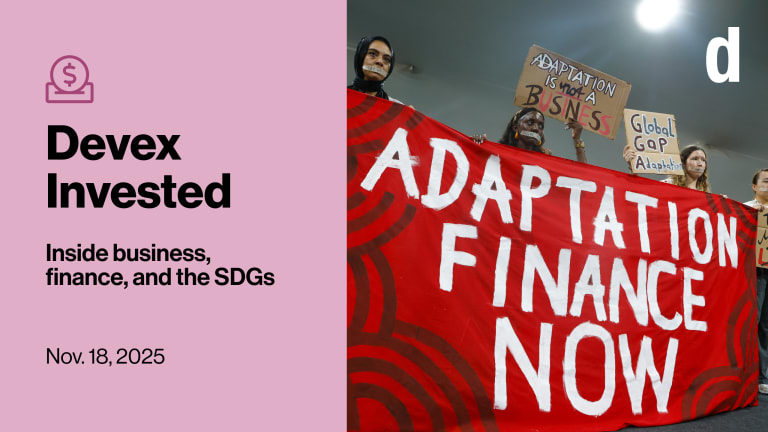
This week, the United Kingdom announced its ambition to become the largest G-7 foreign direct investor in Africa by 2020. To make this happen it aims to generate up to £8 billion ($10.26 billion) of U.K. public and private investment in Africa. Over the next 3 years, CDC, the U.K.’s development finance institution, will aim to invest up to £3.5 billion in Africa while the U.K. government aims to mobilize a further £4 billion of private investment.
This announcement is the first tangible action announced by a G-7 country since the June 2018 Charlevoix Commitment on Innovative Financing for Development, where G-7 leaders committed to support innovative financing approaches for development.
Theresa May in Africa: The key development issues
Devex rounds up the key development issues of Teresa May’s visit to the African continent, and what they could really mean for the U.K.'s partnership with Africa.
It is also the latest example of a trend where governments are turning to innovative finance, mobilizing the private sector to make their development funds achieve larger impact. Other examples include Germany’s compact with Africa and Canada’s Feminist International Assistance Policy.
The need to mobilize private investment in Africa is clear. Africa has the lowest income per capita, the highest population growth rate, and lags in most indicators in the Human Development Index. The African Development Bank estimates a financing need of some $650 billion annually in Africa and the International Monetary Fund identifies the need to create 20 million new jobs annually.
While the U.K. government announced a sizable capital increase for the successful Private Infrastructure Development Group, it does not provide details on how it plans to mobilize private investment. Presumably, CDC funds will be co-invested on equal or comparable terms with private sector investment, but this approach will not reach those segments with the highest unmet financing needs, such as small- and medium-sized enterprises — which the AfDB estimates will create 80-90 percent of jobs in Africa, due to the significant challenges of mobilizing private investment to Africa.
Among these challenges is the high risk of investment: Half of Africa’s 54 countries have a median credit rating of “B+” and the large majority of private sector borrowers in Africa have an implied rating of “CCC” — extremely high risk. These ratings imply an expected probability of default and expected losses for a typical borrower around 12-20 times higher than investment grade. Very few investors are prepared to invest at this risk. Compounding traditional credit risk on the continent is the very high currency risk.
Another challenge is the mismatch in financing needs and criteria: Most African SMEs financing needs are quite small, ranging from $1,000-$5,000,000. Most institutional investors, however, invest much larger amounts — typically $50 million or higher per investment.
So how can the U.K. government mobilize £4 billion of private sector financing to African countries when they’re considered high risk and there is such a mismatch between the countries’ investment needs and the investment criteria of private investors?
“Blended finance makes it possible to create investments that meet the criteria of most private investors by (i) reducing risk to an acceptable level and (ii) bridging the huge gap between perceived and realized risk in developing countries.”
—The answer to these challenges is blended finance — the use of development capital from development agencies and philanthropic foundations to attract commercial capital from private-sector investors.
Blended finance makes it possible to create investments that meet the criteria of most private investors by (i) reducing risk to an acceptable level and (ii) bridging the huge gap between perceived and realized risk in developing countries. Time and time again, the realized risk — i.e., actual losses — has proven to be much lower than perceived risk — i.e., expected losses — in emerging markets. This is strongly evidenced in the recurring profits of multilateral development banks and DFIs such as the European Bank for Reconstruction and Development and the International Finance Corporation.
Using development capital to create risk-return profiles acceptable for the private sector and to scale up African investments allows the U.K. to achieve its development objectives while attracting new investors and critical investment to Africa.
Given the challenges listed above, a blended finance solution that can reach those in highest need could include:
1. Creating a portfolio of investment assets diversified across several companies/projects, countries, and currencies.
2. Mobilizing private investors to invest in senior notes while the U.K. government provides junior capital to bear first losses and bridge the risk perception gap.
3. Ensuring a good percentage of the portfolio includes financing to SMEs.
Using blended finance to mobilize private investment into Africa isn’t new. Based on Convergence’s database of over 300 historical blended finance deals representing $100 billion, over 50 percent of blended finance transactions have targeted Africa. But in a highly fragmented and inefficient way.
The U.K. government’s ambitious commitment tells us that this number can only be expected to increase, and places it in a position to lead its G-7 partners and other counterparts to execute blended finance deals to draw in more private capital to the places that need it most, at the scale required.
In the last few years, there has been a surge of interest and optimism in the potential of mobilizing private capital toward the Sustainable Development Goals. Blended finance offers a unique opportunity to channel this optimism into real-world impact.








